Pancragen 20mg (Bioregulator)
$65.00
Pancragen is a naturally occurring tetrapeptide bioregulator that has primary effects on the pancreas. Pancragen research has shown it to help control blood sugar, improve endocrine function of the pancreas, regulate melatonin expression, and reduce the incidence and magnitude of metabolic syndrome. It has been researched and is of interest in the treatment of both diabetes and the metabolic effects of aging. Pancragen can be thought of as an anti-aging peptide for the pancreas.
Pancragen is a naturally occurring tetrapeptide bioregulator that, as the name implies, has primary effects on the pancreas. Not to be confused with the DNA-based PancraGEN test, Pancragen has been shown to help control blood sugar, improve endocrine function of the pancreas, regulate melatonin expression, and reduce the incidence and magnitude of metabolic syndrome. It has been investigated and is of interest in the treatment of both diabetes and the metabolic effects of aging. To some extent, Pancragen can be thought of as an anti-aging peptide for the pancreas.
Pancragen and Aging
Research on pancreatic cells shows that Pancragen stimulates the expression of a number of differentiation factors that control the growth of acinar and islet of Langerhans cells. The latter are responsible for insulin and glucagon [1]. Though this may not seem like an anti-aging effect, it should b clear that restoration of improved growth and differentiation is a feature of young, healthy tissues. Improving these parameters, particularly in older tissues, is fundamentally an anti-aging effect. Throughout the rest of the sections of Pancragen, additional reasons for its classification as an anti-aging peptide will be manifest. In particular, its ability to change the epigenetic regulation of DNA to improve gene expression is one of the clearest indications that Pancragen can turn back the clock on DNA to promote function more in keeping with youth.
Pancragen and Metabolic Disorders
Further supporting the idea that Pancragen is an anti-aging peptide are its effects on metabolic disorders. Research shows that metabolic dysregulation in older people is at least partially caused by changes in melatonin secretion during sleep. This melatonin deficiency appears to be caused by changes in insulin levels, suggesting that loss of insulin function, both in disease and as a result of old age, may be responsible for changes in melatonin secretion, which is then responsible for some of the other symptoms of metabolic syndrome[2].
Based on the above line of thought, it stands to reason that administration of Pancragen, which helps to normalize insulin secretion, could further reduce symptoms of metabolic syndrome by normalizing melatonin secretion. In fact, this is precisely what research reveals. Administration of Pancragen decreases glucose levels but also reduces plasma concentrations of insulin as well as the insulin resistance index which are strong indications that Pancragen is having a direct effect on melatonin signaling[2].
Both exogenous and endogenous melatonin inhibit the pathophysiological mechanisms of metabolic syndrome and normalize metabolism[3]. Research shows that melatonin receptors exist in the pancrease where they serve to modulate insulin and glucagon signaling in a diurnal (daylight-sensitive) fashion [4]. There is a lot of new research focusing on how disruptions in melatonin signaling are linked to the development of type 2 diabetes and metabolic syndrome.
If melatonin affects the pancreas, then is stands to reason that there is likely a feedback mechanism by which glucagon and insulin signal to the pineal gland whether to increase or decrease melatonin release. In fact, this feedback loop exists and, in type 2 diabetes, appears to be responsible for the additional metabolic effects that arise in this version of the disease that are less common in type 1 diabetes. This would explain why Pancragen’s ability to regulate insulin secretion of the pancreas also has beneficial effects on other symptoms of metabolic syndrome.
Pancragen and Diabetes
Of course, the most obvious use for Pancragen is in the treatment of diabetes, hyperinsulinemia, and elevated blood glucose levels. Research in rhesus monkeys comparing Pancragen to glimepiride (a widely used drug for lowering blood sugar) reveals that while both compounds can reduce blood sugar levels to normal baselines, only Pancragen normalizes insulin levels and C-peptide levels [5], [6]. This would suggest that Pancragen is having a more physiologic effect, striking at the very heart of what causes elevated blood sugar and correcting the problem at a more fundamental level.
Research in old monkeys shows that Pancragen normalizes plasma insulin, C-peptide, and glucose levels within 10 days and that the effect lasts, at least partially, for as long as 3 weeks[7], [8]. This suggests that Pancragen might be useful in restoring pancreatic function in elderly individuals or maintaining it as we age. This can help to normalize the metabolic system and reduce the impact of everything from osteoporosis to dementia.
Additional research in cell cultures shows that Pancragen increases the expression of matrix metalloproteinases MMP2 and MMP9. It also increases the expression of serotonin, glycoprotein CD79alpha, and the anti-apoptotic protein MCI1 while decreasing levels of the pro-apoptotic protein p53. Additionally, levels of proliferation markers PCNA and Ki67 are increased. Vasili Ashapkin, author of the textbook DNA Methylation in Plants and collaborator with Vladimir Khavinson, points out that these findings collectively indicate that Pancragen activates the expression of signaling molecules associated with increased differentiation and functionality of pancreatic islet cells[9], [10]. These effects can only be accounted for by a broad functional mechanism such as direct alteration of DNA expression and condensation patterns. In other words, Pancragen is likely working at a very fundamental level within the DNA to alter the expression of multiple genes.
Pancragen and the Vascular System
One of the most serious consequences of diabetes is on the function of small blood vessels called capillaries. Elevated glucose levels cause these capillaries to first become leak and then to die off as the cells that make them up, called endothelial cells, become dysfunctional and then die. Many of the long-term consequences of diabetes like heart disease, kidney disease, erectile dysfunction, and loss of limb result from damage to and loss of capillaries.
Research on Pancragen shows that it helps to normalize the adhesion of mesenteric capillary endothelium [11]. These findings suggest that Pancragen could protect the endothelium from some of the effects of diabetes, thus helping to stave off long-term consequences of the disease.
Pancragen and the Vascular System
One of the most serious consequences of diabetes is on the function of small blood vessels called capillaries. Elevated glucose levels cause these capillaries to first become leak and then to die off as the cells that make them up, called endothelial cells, become dysfunctional and then die. Many of the long-term consequences of diabetes like heart disease, kidney disease, erectile dysfunction, and loss of limb result from damage to and loss of capillaries.
comprehensive FAQ for Pancragen 20mg (Bioregulator), a peptide-based supplement designed to support pancreatic health and metabolic function.
What is Pancragen?
Pancragen is a synthetic tetrapeptide bioregulator with the amino acid sequence Lys-Glu-Asp-Trp (KEDW). It is derived from peptides originally isolated from bovine pancreatic cells. Pancragen is designed to support the endocrine function of the pancreas, regulate blood sugar levels, and improve metabolic health.
What are the potential benefits of Pancragen?
Research suggests that Pancragen may offer several benefits:
-
Blood Sugar Regulation: Helps control blood glucose levels by supporting insulin and glucagon secretion.
-
Pancreatic Function Support: Enhances the endocrine function of the pancreas, potentially aiding in the treatment of diabetes and age-related metabolic issues.
-
Melatonin Expression Regulation: Normalizes melatonin secretion, which may reduce symptoms associated with metabolic syndrome.
-
Anti-Aging Effects: May influence gene expression related to pancreatic cell differentiation, contributing to anti-aging effects on pancreatic tissue.
-
Immune System Support: By maintaining normal pancreatic function, Pancragen can contribute to overall immune system support.
How does Pancragen work?
Pancragen is believed to penetrate cellular membranes and interact with the nucleus and nucleolus, potentially influencing gene transcription associated with pancreatic cell differentiation. It may up-regulate the expression of key differentiation factors and modulate the expression of molecules involved in cell proliferation and apoptosis.
What is the recommended dosage?
The typical dosage of Pancragen is 2 mg per day. It is often administered orally or intramuscularly, depending on the specific protocol and individual needs. One pen provides enough for 10 doses or 10 days. Exploring PeptideNationUSA Are there any side effects?
Pancragen is generally well-tolerated. However, some individuals may experience mild side effects, such as gastrointestinal discomfort, nausea, or allergic reactions. These effects are rare but should be monitored.
Is Pancragen suitable for everyone?
Pancragen is generally recommended for adults seeking to support pancreatic and metabolic health. Individuals with chronic conditions, such as diabetes or pancreatitis, should consult their healthcare provider before starting Pancragen to ensure proper integration into their treatment regimen.
Can Pancragen be combined with other treatments?
Yes, Pancragen is often used alongside other supplements or therapies for broader wellness. However, it’s important to consult with a healthcare provider to ensure all components of your program are compatible.
Where can I purchase Pancragen?
Pancragen is available through various peptide suppliers, including:
Please note that Pancragen is intended for research and development use only and is not approved for human consumption.
Vendor:PeptideNationUSA
5 reviews for Pancragen 20mg (Bioregulator)
Add a review Cancel reply
Related products
Bioregulators
Bioregulators
Bioregulators
Bioregulators
Bioregulators
Bioregulators
Bioregulators
Bioregulators

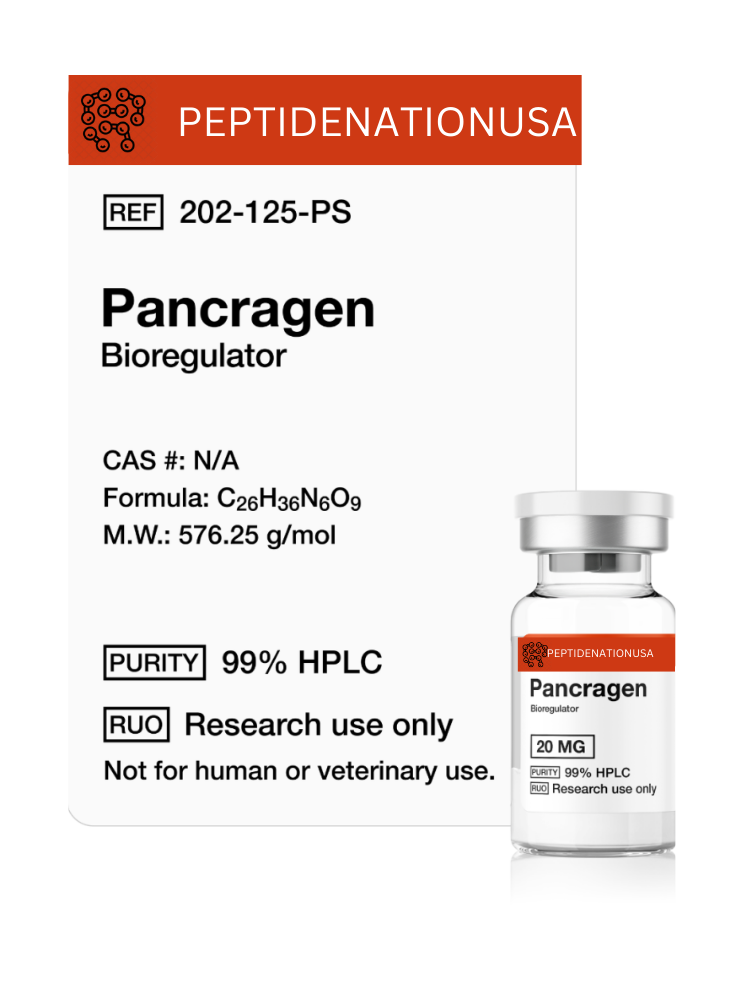

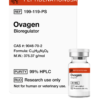


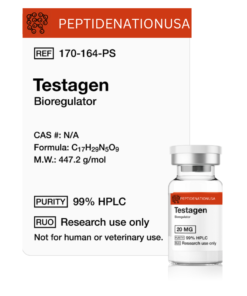
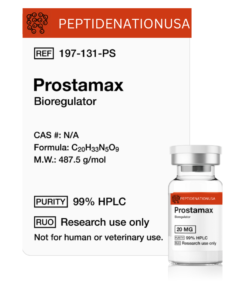


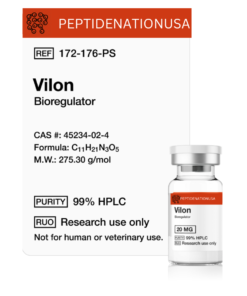

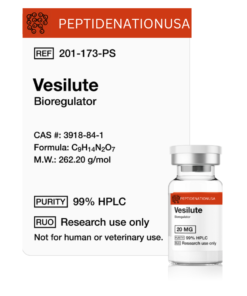
James Sanders –
Mild effects at first, but got stronger over time. Very satisfied.
Olivia Green –
Highly recommend this bioregulator. It’s made a big difference for me.
James Brooks –
Perfect for what I needed. Thank you!
Rebecca Bennett –
My energy levels and focus have improved since starting this
Sarah Moore –
Mild effects at first, but got stronger over time. Very satisfied.